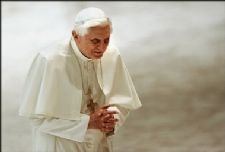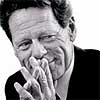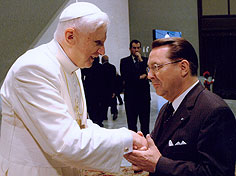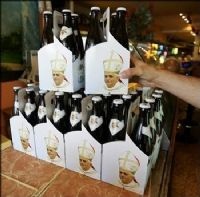- Behind Benedict's Vatican Overhaul, by Jeff Israely. Time Sept. 11, 2006:
So while the Pope enjoys his homecoming this week (Monday he traveled to the small Bavarian town of Marktl am Inn where he was born), Vatican insiders say the beginning of the Benedict era back at the Roman Curia begins in earnest this fall. Some, in fact, predict that Bertone — a longtime trusted confidante of the former Cardinal Ratzinger — was handpicked to be Secretary of State in order to usher in a virtual revolution in the way Catholic Church headquarters operates. Through an effort that will be part downsizing, part priority overhaul, the theologian pontiff is said to want Church headquarters to be both a more holy and a more efficient entity.
See also " The Pontificate Begins", by Jeffrey Tucker (New Liturgical Movement).Though the changing of the guards has been more deliberate than some had wanted — especially those critical of the power that Sodano had amassed in the last years of John Paul's papacy — the new Pope has nonetheless already made some notable personnel moves, with others sure to come. Here are five key changes that have taken place since Benedict took over in April 2005, and five more shifts that may be on the horizon. . . .
 September 8, 2006. In his Ad Limina meeting with the Bishops of Ontario, Canada, Pope Benedict once again touched on the perils of relativism:
September 8, 2006. In his Ad Limina meeting with the Bishops of Ontario, Canada, Pope Benedict once again touched on the perils of relativism:Today, the impediments to the spread of Christ’s Kingdom are experienced most dramatically in the split between the Gospel and culture, with the exclusion of God from the public sphere. Canada has a well-earned reputation for a generous and practical commitment to justice and peace, and there is an enticing sense of vibrancy and opportunity in your multicultural cities. At the same time, however, certain values detached from their moral roots and full significance found in Christ have evolved in the most disturbing of ways. In the name of ‘tolerance’ your country has had to endure the folly of the redefinition of spouse, and in the name of ‘freedom of choice’ it is confronted with the daily destruction of unborn children. When the Creator’s divine plan is ignored the truth of human nature is lost.
(Hat tip: Rocco Palmo @ Whispers in the Loggia).False dichotomies are not unknown within the Christian community itself. They are particularly damaging when Christian civic leaders sacrifice the unity of faith and sanction the disintegration of reason and the principles of natural ethics, by yielding to ephemeral social trends and the spurious demands of opinion polls. Democracy succeeds only to the extent that it is based on truth and a correct understanding of the human person. Catholic involvement in political life cannot compromise on this principle; otherwise Christian witness to the splendour of truth in the public sphere would be silenced and an autonomy from morality proclaimed (cf. Doctrinal Note The Participation of Catholics in Political Life, 2-3; 6). In your discussions with politicians and civic leaders I encourage you to demonstrate that our Christian faith, far from being an impediment to dialogue, is a bridge, precisely because it brings together reason and culture. . . .
A particularly insidious obstacle to education today, which your own reports attest, is the marked presence in society of that relativism which, recognizing nothing as definitive, leaves as the ultimate criterion only the self with its desires. Within such a relativistic horizon an eclipse of the sublime goals of life occurs with a lowering of the standards of excellence, a timidity before the category of the good, and a relentless but senseless pursuit of novelty parading as the realization of freedom. Such detrimental trends point to the particular urgency of the apostolate of ‘intellectual charity’ which upholds the essential unity of knowledge, guides the young towards the sublime satisfaction of exercising their freedom in relation to truth, and articulates the relationship between faith and all aspects of family and civic life. Introduced to a love of truth, I am confident that young Canadians will relish exploring the house of the Lord who "enlightens every person who comes into the world (Jn 1:9) and satisfies every desire of humanity.
- September 5 was the memorial of Mother Teresa of Calcutta, recognized as a model of Christian love in the Pope's first encyclical -- two of the three times in connection with the mention of saints. Teresa Polk has the references.
- Generation Benedikt - The PRF (Papa Ratzinger Forum) reports that
A group of 12 young Catholics from Germany, France, Italy, Mexico and the USA decided to start on the first anniversary of WYD in Köln an international platform for young people identifying themselves with the message of Pope Benedict XVI. The inauguration took place 26/08 in the Archdiocese of Köln. [website: Generation Benedikt].
- In our July 2006 roundup we linked to Pope or Heretic? An Evaluation of Pope Benedict XVI, LumenGentleman Apologetics' examination of "radtrad heresy hunters" who are plumbing the writings of then-Joseph Ratzinger, just as they did with his predecessor. In The Hunt for Heresy: Dr. Droleskey vs. Cardinal Ratzinger, LumenGentleman Apologetics' Jacob Michael revisits the topic, addressing a new attack on the Pope by Dr. Droleseky:
Lately, Dr. Droleskey has gotten cozy with the Sedevacantist position, which appears to have emboldened him to step up the harsh invective against the Roman Pontiff. His August 21, 2006 article, "A New Theology for a New Religion", tops out at some 75 pages of single-spaced text, 50 pages of which are filled with interminably long quotes from other writers.
The weakness of Dr. Droleskey, one he shares with many critics of the Pope, is that "he does not understand what he is reading in Ratzinger":
Whatever suspicion might remain that Droleskey just "doesn't get it" is confirmed by the few words of commentary that he does interject. The article purports to be a kind of analysis of Ratzinger's book, Principles of Catholic Theology, but in reality it is little more than a collection of lengthy quotes from Ratzinger's work, juxtaposed against equally lengthy quotes from 19th-20th century popes, with a few of Droleskey's own words of righteous indignation serving as a shaky bridge between the two. . . . READ MORE
Droleskey was profiled in a recent e-letter by Catholic apologist Karl Keating, asking:Once he was able to get the attention of a third of New York's Republican voters. Now he struggles to get anyone's attention. It is not likely that many of those voters would recognize the candidate of 1998 in the itinerant essayist of 2006. What happened?
Dr. Droleskey: a warning to those who presume themselves to be "more Catholic than the Pope." - Benedict, The Peace Pope. National Catholic Register Sept. 3-9, 2006. Angelo Matera (editor of Godspy.com), takes a look at Pope Benedict's response to the August-2006 conflict between Israel and Hezbollah/Lebanon and takes a swipe at "Catholic “hawks” in the United States." (Discussion of the article at Amy Welborn's).
- The Pope Rewrites the Handbook of the Good Pastor, by Sandro Magister. www.Chiesa. Sept. 5, 2006:
Fielding questions in public and responding spontaneously is one of the hallmarks of pope Joseph Ratzinger’s communication style.
According to Magister, the complete transcript of his conversation with the priests of Albano numbers a good 6,000 words in length, was released by the Vatican press office the following day, and appeared in the September 2 edition of L’Osservatore Romano in Italian only. Magister produces about a third of the exchange; Teresa @ the Papa Ratzinger Forum has another transcript, and here is the complete Italian text of the exchange from the Vatican Website. (Hat tip, Amy Welborn).He used this method on October 15, 2005, with the children who had received their first communion that year crowded into Saint Peter’s Square. And he did so on April 6 of this year, again in Saint Peter’s Square, with the young people preparing for World Youth Day.
Each time, the pope seeks to adapt his responses to the audience in front of him.
To the priests of the diocese of Albano, in fact, he delivered what almost amounted to a handbook on good pastoral ministry: how to celebrate Mass, how to recite the breviary, how to administer the sacraments, how to draw near those “far away,” how to be faithful to the duty of chastity, how to show to married couples the beauty of matrimony, and to young people the conversion of a Saint Francis. . . .
Previous transcripts of spontaneous "Q&A's" with the Holy Father are archived here @ the Pope Benedict XVI Fan Club.
 Dissident Kueng criticises pope during German visit Deutsche Presse Agentur. Sept. 13, 2006. Speaking at his home in Tuebingen, Germany, disgruntled theologian Hans Keung berated the Pope for being an old fuddy-duddy and neglecting the path of reform:
Dissident Kueng criticises pope during German visit Deutsche Presse Agentur. Sept. 13, 2006. Speaking at his home in Tuebingen, Germany, disgruntled theologian Hans Keung berated the Pope for being an old fuddy-duddy and neglecting the path of reform:[Kung] slammed Pope Benedict XVI on Wednesday for not offering dialogue during a six-day visit to Germany. There had not been "a single future-oriented signal" from the pope, nor were there any suggestions of reforms on the way, Kueng told Deutsche Presse-Agentur dpa in an interview.
I find that it's easier to understand Kung if you understand his reference to "dialogue" as a keyword for "capitulation". For instance:Kueng, who was invited to a long lunch and talk with Benedict in Italy last year, said the visit had made a contradictory impression.
"He didn't fulfil any of the hopes of reform-oriented Catholics. . . .
[Kung] said Benedict had been "tactically smart to stay silent about the rule of celibacy for priests, or the ban on contraceptives and other uncomfortable Roman rules.
And to think it was only last September and in the first year of his pontificate that Pope Benedict had invited his former academic colleague for a friendly four-hour-long chat over dinner, culminating in the Swiss theologian's praise of the invitation as a "sign of hope for many in the church with the same vision as mine.""He was always stressing the nice side of faith and the church and leaving the harsh church rules that still exist unmentioned."
Kueng added, "I don't see dialogue in practice."
Past articles on the Ratzinger-Kung relationship, see The Effluence of Kung, The Brevity of Ratzinger Against The Grain January 5, 2005; "Kung's Gripe" (in which he accused Cardinal Ratzinger with "manipulating the papal conclave with a campaign to have Pope John Paul made a saint") and the Sept. 27, 2005 Pope Benedict Roundup on the Benedict-Kung meeting.
On a Lighter Note . . .
- Recollections from Pope's former housekeeper Independent Catholic News Sept. 21, 2006. Sister Agapita, of the Sisters of Mercy convent in Munich, was a housekeeper to Cardinal Ratzinger, before he became Pope Benedict XVI. She was one of 50 people who received Communion from the Pope during his recent Mass at Munich-Riem. Sr Agapita reminisced with journalist Tess Crebbin:
"We spent many joyful moments together," she said by phone. "It was much more than just your average housekeeper-Cardinal relationship, because he really involved us in his daily life and we also used to pray together." [...]
Sister Agapita related how, when the Pope John Paul II was shot, Cardinal Ratzinger immediately " gathered all of us around to say the rosary together with him for the Pope's recovery. I thought it was really significant that he had asked his staff to join him in prayer, fostering among us the feeling of community and union."
 Also interviewed this month by the Catholic News Agency is Thaddäus Kühnel, the Pope’s “courier,” chauffuer, friend, and confidant Munich, Sep. 07, 2006 (CNA):
Also interviewed this month by the Catholic News Agency is Thaddäus Kühnel, the Pope’s “courier,” chauffuer, friend, and confidant Munich, Sep. 07, 2006 (CNA):Kühnel, who is Director of the Bank of Munich, met then Cardinal Ratzinger in 1978 at the home of the Sisters of Mercy at Bad Adelholzen. In an interview with German television, Kühnel explained that he is known as the “Pope’s courier” because when Cardinal Ratzinger was called to work in the Roman curia, he offered to bring “Bavarian things” to him in Rome, which he did and still does to this day.
According to Tess Crebbin of the Catholic News Service, Kühnel was invited to spend the night in the Regensburg seminary with the pontiff during his Sept. 9-14 trip to Germany:“The first thing I brought to Rome, in my car, was a paschal candle, as well as some fruit from Adelholzen and mineral water. For Christmas I brought him his Advent wreath, as they can’t be easily found in Italy. Up to now I have brought some 40 different objects,” Kühnel explained. “He likes the Christmas cookies that women from Bavarian parishes bake at home as well as those made at certain monasteries. He also likes the chocolates made in Aachen”, he added.
Kühnel said he’s also acted as Cardinal Ratzinger’s chauffuer and that he often picked him up at the airport and “brought him to Pentling or Ratisbona to his brother’s home. Sometimes I drove the whole family—the cardinal, his brother Georg and their sister Maria. The little trips we took to Mallersdorf, Brixen, Linz, Klagenfurt, and Bad Hofgastein—most of the time with the entire family—were very beautiful,” Kühnel said. . . .
"I was very surprised and honored when I received a letter stating that I am to stay overnight at Regensburg," Thaddaeus Kuehnel, director of the Hauck and Aufhauser private bank in Munich, told Catholic News Service. "The request came from the Regensburg seminary, by letter."
Kuehnel said he did not know why he received an invitation when so many of the pope's other friends remain uncertain if they will have a chance to meet with him.
"It may have something to do with the fact that our friendship goes back some 30-odd years," Kuehnel said. "Long before he became pope, when he faced controversy at home and abroad, I always spoke out for him, and I think he never forgot this.
- The Associated Press tried to downplay Benedict's homecoming with some pre-emptive liberal spin, claiming that "Many Germans [are] still skeptical about native son Pope Benedict XVI" (International Herald Tribune Sept. 8, 2006):
"I think he's a man of the past, and he's trying to cement these conservative tendencies in place," said Rupert Kreuzpaintner, a churchgoing Catholic from Landshut in Benedict's home region of Bavaria who sees the pope as too authoritarian within the church.
Prompting some readers to wonder just which parish the "churchgoing Catholic" Kreuzpaintner has been attending? -- The article goes on to note that "Munich police expect at least 500,000 visitors in the Bavarian capital."Although he is critical of Benedict, "my faith is not affected by that," said Kreuzpaintner, 45. "But for me it is a revolting thing, that a Godlike cult is made around such a person who stands for exactly the opposite of what the message should be."
On the other hand, Germany is "Finding Religion" (TheTrumpet.com Sept. 21, 2006):
Germans’ warm reception to Pope Benedict’s visit to his native Bavaria last week, coupled with the broader trend toward recognizing the religious underpinnings of Europe, are signs that the secularism of Europe is on the way out.
- Benedetto, der Leuchtturm" ["Benedict the Light House"] Der Spiegel Sept. 9, 2006. Gerald Augustinus (Closed Cafeteria) provides us with a english translation. After describing the Catholic Church as having been "the boogeyman in the eyes of the average progressive German, the incarnation of a spirit hostile to enlightenment, the head of the worst reactionary bigotry, representative of the Middle Ages, holding on stubbornly", Der Spiegel observes a "sea change" in the relationship between church and society, "the motor of which", suprisingly, was the Catholic Church:
n 2005, the year of the change of Popes and World Youth Day in Cologne centuries-old abilities of Catholicism coincided with new styles of expression fo the media and event society. In contrast to the liturgically, spiritually and ritualistically rather stuffy Protestantism, Catholicism has always been a religion of senses, theater and demonstrative stagings. With the Pope as its hea it could and can personalize its message worldwide.
As one reader notes, "It looks as if one typical stereotype is still prominant. Nothing is said about the Church's intellectual appeal."This potential to produce images, to create a charismatic aura, to move masses of people to pilgrimages has been fully used by Catholicism in its nature of a robust, global, organized and experienced institution - and the media hungrily bought it. The pictures of the Polish Pope went around the world - his folksy approach to the faithful, dignified blessings and his increasing suffering that he defied like a grand martyr, who even and especially in his dying electrified the Catholic masses.
World Youth Day became an image-rich spectacle, where the charismatic cult of the Pope with its vivacious waves of hundreds of thousands of young people even captivated the cool intellectual Joseph Ratzinger. "We are Pope" the Bild newspaper famously headlined - and the young crowds chanted "Benedetto, Benedetto."
Still, Gerard observes about another Spiegel article on the Pope's visit:
[Der Spiegel is] definitely friendlier since Pope John Paul II. died. It used to be the magazine for all the whiners - Kueng, Drewermann, Ranke-Heinemann etc. The latter two have since left the Church. Rebellion suddenly isn't that cool anymore but rather something very old-fashioned. Heck, the article's even called "Joseph's Return" and misses the usual snarky remarks.
- Coming to us by way of Jimmy Akin), New Zealand website OddStuff relays the story that Pope Benedict's father met his mother by advertising for a wife in a local Roman Catholic newspaper:
Bild am Sonntag (BamS) said 43-year-old Joseph Ratzinger senior placed an advertisement as a "low-level civil servant" seeking "a good Catholic girl, who can cook and sew a bit ... to marry as soon as possible, preferably with a picture," in a Bavarian paper in March 1920.
Joseph Ratzinger senior and Maria Peintner were married in November 1920.Four months later – by now a "mid-ranking civil servant" – he posted a similar notice in the same paper, and this time received a reply from Maria Peintner, the Pope's future mother, BamS reported, citing documents from Bavarian state archives.
Click here for the original article from Bild am Sonntag, with photos of Joseph's parents and a shot of "baby Ratzinger."
 "Benedictwiser, the Pope of Beers", by Curt Jester / Photo via Greg Krehbiel:
"Benedictwiser, the Pope of Beers", by Curt Jester / Photo via Greg Krehbiel:This beer has a real great head and talk about theology on tap. Plus it is not weak like those heretical dissident beers. You know the ones that are all watered down. Pope Benedict Beer is fine with fish, meat, biblical exegesis, Magisterial documents, and spiritual reading. Great also for preparing to talk with dissidents or anyone you know you will be at lagerheads with.

No comments:
Post a Comment